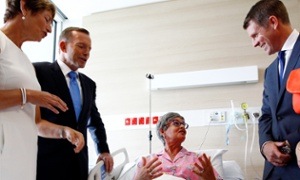
The New South Wales premier, Mike Baird, is demanding the federal government use the May budget to explain how it intends to solve a huge looming shortfall in hospitals funding and acknowledge it used its last budget to handball the problem to the states.
In last year’s federal budget the Abbott government removed $52bn in projected forward funding for hospitals – around $16bn of it scheduled to go to NSW – that had been agreed as part of a deal between the former Labor government and the states to deal with hospital costs rising to levels equivalent to some states’ entire spending.
The move was seen as a way to force premiers to the negotiating table over tax reform, but in a blunt message to his federal colleagues Baird is insisting the issue be addressed sooner.
Acknowledging that the leasing of the state’s electricity poles and wires would not generate enough revenue to pay for its hospitals, Baird told ABC radio the issue was “something that needs to be resolved … it’s not sustainable, to pass that health cost, which is the biggest cost to every state budget, down – that is the number one issue, we need to ensure the federal government deals with.”
He noted the prime minister had said hospitals funding would be discussed after the release of the federal government’s taxation white paper, but said: “I think it needs to be earlier, it has to be considered as part of this budget because it is the biggest budget challenge we are facing.”
Asked what the premier wanted to see in this federal budget, a spokesman told Guardian Australia: “what he would like to see in the federal budget is an acknowledgement that the tax white paper will deal with long-term health costs. In other words, that the transfer of long-term costs to the states in the budget last year is not a closed issue.”
Baird has said that if re-elected on Saturday, he will chair a meeting with other premiers within weeks, where long-term hospitals funding would be “front and centre”.
In its 2016 budget, the Abbott government said that from 2017, the federal government’s share of hospital spending would grow each year in line with inflation and not by the previously promised 6% or more, which had been calculated to help meet the actual cost of running hospitals. The intergenerational report assumed that level of commonwealth funding would continue indefinitely.
In a recent interview with Michelle Grattan, Baird said: “what happened last federal budget is not sustainable. That was, the commonwealth and the federal government said, ‘We are going to allocate a large part of the future growth in health costs from ourselves to the state governments.’
“Now I said at the time, and I say it again … both publicly and privately to the prime minister, that is not sustainable. The states do not have the capacity to meet those health costs on their own. The commonwealth has a critical role to play.”
